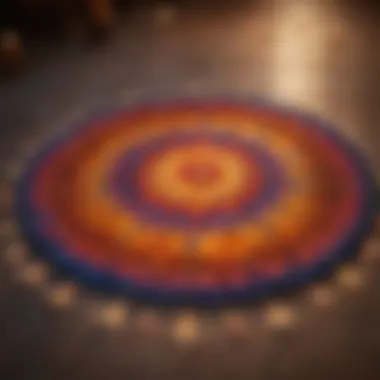Delving into the Rich Cultural Heritage of Diwali Celebrations: Significance and Traditions


Nature Topic Overview
Diwali, also known as the Festival of Lights, holds immense cultural and spiritual significance in India. The festival symbolizes the victory of light over darkness, good over evil, and knowledge over ignorance. Celebrated by millions of Hindus, Sikhs, Jains, and Buddhists around the world, Diwali is a time of joy, unity, and renewal.
Fun Facts and Trivia
- Diwali lasts for five days and each day has its own significance. From cleaning and decorating homes on Dhanteras to lighting oil lamps and bursting firecrackers on Diwali night, each ritual holds deep meaning.
- Rangoli, intricate patterns made using colored powders or rice grains, adorn entrances during Diwali to welcome goddess Lakshmi.
- Delicious sweets like Gulab Jamun, Jalebi, and Laddoos are exchanged among friends and family during Diwali as a symbol of prosperity.
- Fireworks are a common sight during Diwali, symbolizing the joy of the people welcoming the homecoming of Lord Rama after 14 years of exile.
Wildlife Explorations
- Peacocks, the national bird of India, are often associated with Diwali due to their presence in Indian mythology and folklore. Their vibrant plumage signifies beauty and grace.
- Rice, a staple food in Indian households, plays a significant role in Diwali rituals like offering prayers and cooking traditional dishes like kheer (rice pudding).
Environmental Awareness
- Diwali is also a time to promote environmental consciousness. Opt for eco-friendly decorations like using clay diyas (earthen lamps) instead of plastic ones to reduce waste.
- Encourage children to avoid fireworks that contribute to air and noise pollution. Instead, opt for safer and more sustainable ways to celebrate the festival.
DIY Nature Activities
- Engage children in creating eco-friendly decorations such as recycled paper lanterns or organic rangoli designs using flower petals and leaves.
- Teach kids about the significance of plants like tulsi (basil) and marigold in Diwali celebrations, and involve them in planting and caring for these plants.
- Organize nature walks for children to appreciate the beauty of nature during Diwali, emphasizing the need for conservation and preservation.
Understanding the Origins of Diwali
Diwali, also known as the Festival of Lights, holds deep cultural and historical significance in the hearts of millions. Understanding the Origins of Diwali is crucial in unraveling the layers of traditions and customs that define this auspicious occasion. By delving into the roots of Diwali, we gain a profound insight into the evolution of the festival and its relevance in modern times. Exploring how Diwali came to be celebrated can provide enlightenment on the diversity of practices and the global impact of this vibrant festival.
Historical Roots
The Mythological Legends
Embark on a journey through the captivating Mythological Legends that underpin the essence of Diwali. These mythological tales, passed down through generations, serve as pillars of cultural heritage and spiritual wisdom. The intricate details of these legends offer a glimpse into the beliefs and values cherished by those who celebrate Diwali. By understanding The Mythological Legends of Diwali, we unravel the symbolism and metaphors that enrich the festival experience, making it a cherished tradition for many.
The Evolution of Diwali
Witness the Evolution of Diwali as it transitions through time, blending ancient practices with contemporary customs. The evolution of Diwali reflects the changing landscapes of society and the resilience of cultural traditions. Exploring how Diwali has evolved sheds light on the adaptive nature of celebrations and highlights the deep-rooted connections to history and spirituality.
Influence of Different Cultures
Dive into the tapestry of Influence of Different Cultures on Diwali celebrations, showcasing the diversity and inclusivity of this festival. The fusion of varying cultural influences enriches the tapestry of Diwali, creating a vibrant mosaic of traditions. Understanding the Impact of Different Cultures on Diwali illuminates the universal appeal of the festival and celebrates the harmony in diversity, making it a truly global phenomenon.


Religious and Cultural Significance
Unveil the Religious and Cultural Significance of Diwali, where ancient beliefs and practices intertwine to create a tapestry of spiritual enlightenment. The festival embodies The Victory of Light over Darkness, symbolizing the triumph of knowledge over ignorance and good over evil. Delving into the Symbolism in Diwali Practices reveals the profound meanings behind traditional rituals, offering a glimpse into the spiritual depth of the festival.
The Victory of Light over Darkness
At the core of Diwali lies The Victory of Light over Darkness, a symbolic representation of inner light dispelling ignorance and negativity. This enduring theme resonates across cultures, uniting individuals in a shared quest for spiritual enlightenment. The Victory of Light over Darkness serves as a beacon of hope and positivity, inspiring introspection and renewal during the festival.
Symbolism in Diwali Practices
Explore the intricate Symbolism in Diwali Practices, where each ritual and custom holds a deeper spiritual meaning. From lighting diyas to decorating homes, every aspect of Diwali carries symbolic significance that connects individuals to their faith and cultural heritage. Unraveling the Symbolism in Diwali Practices provides a profound understanding of the festival's essence, fostering a sense of connection and reverence among participants.
Diwali across Various Regions
Discover the kaleidoscope of Diwali celebrations across Various Regions, each reflecting the unique cultural nuances and traditions of diverse communities. The vibrant tapestry of Diwali practices showcases the richness of regional customs and beliefs, adding depth and diversity to the festival. Exploring Diwali across Various Regions fosters a sense of unity amidst diversity, highlighting the universal appeal and enduring spirit of this cherished festival.
Traditions and Customs
Exploring the depth of Diwali celebration unveils an array of rich traditions and customs that hold significant cultural value. The essence of Diwali lies in these timeless practices that symbolize heritage and spiritual beliefs. Understanding the intricacies of these traditions provides a profound insight into the cultural fabric of Diwali.
Pre-Diwali Preparations
Cleaning and Decoration
The meticulous act of cleaning and adorning homes signifies more than just physical cleanliness; it purifies the mind and welcomes positivity. Thoroughly scrubbing and embellishing every nook and corner prepares households for the festive spirit, creating a vibrant and welcoming ambiance. The meticulous attention to detail during cleaning and the creative flair exhibited in decorations elevate the festive fervor, making it a popular choice among Diwali celebrants.
Shopping and Festive Markets
Delving into the hustle and bustle of vibrant markets adorned with colorful wares evokes a sense of excitement and anticipation. Shopping for traditional attires, gifts, and festive decor items fosters a sense of community engagement and joyous anticipation. The unique blend of culture and commerce in festive markets provides a convenient platform for indulging in traditional shopping sprees, offering both locals and tourists a glimpse into the heart of Diwali celebrations.
Culinary Delights
The culinary landscape during Diwali blossoms with an assortment of delectable treats and savory delights. Special dishes prepared with aromatic spices and traditional recipes bring families together in a shared culinary experience. The preparation and sharing of these culinary delights not only satisfy taste buds but also symbolize unity and togetherness, making it a cherished aspect of Diwali festivities.
During Diwali Celebrations
Lakshmi Puja and Prayer Ceremonies
The reverent act of invoking Goddess Lakshmi through pujas and prayer ceremonies holds a central position in Diwali celebrations. Devotees seek blessings for prosperity and well-being, creating a spiritual connection with the divine. The serene ambiance during these rituals and the emphasis on gratitude make Lakshmi Puja an indispensable part of Diwali traditions.


Fireworks Display and Light Decorations
The crackling sounds of fireworks and the mesmerizing glow of diyas illuminate the night sky during Diwali. Fireworks symbolize the triumph of light over darkness, while light decorations signify the inner illuminative journey towards self-awareness. The visual spectacle and safe revelry associated with fireworks display evoke a sense of joy and celebration among all age groups.
Exchanging Gifts and Sweets
The tradition of exchanging gifts and sweets during Diwali embodies the spirit of giving and sharing. Gifts symbolize love and appreciation, fostering connections and strengthening bonds between families and friends. Handcrafted sweets and intricately packed gifts symbolize thoughtfulness and care, making the act of exchange a cherished tradition during Diwali.
Post-Diwali Traditions
Visiting Friends and Family
After the festive fervor subsides, the tradition of visiting friends and family ensues, enhancing social bonds and camaraderie. These visits extend gratitude and goodwill, reinforcing relationships through personal connections. Sharing laughter and memories during these visits enriches the post-Diwali experience, fostering a sense of community and belonging.
Charity and Giving Back
Engaging in charitable efforts and giving back to the community represent the spirit of selflessness and empathy during Diwali. Acts of charity, whether through donations or volunteering, amplify the festival's essence of compassion and kindness. The act of giving back resonates with the theme of gratitude, bringing joy to both the giver and the recipient.
Reflection and New Beginnings
As Diwali draws to a close, introspection and new beginnings take center stage. Reflection on past deeds and decisions paves the way for fresh starts and renewed commitments. The significance of reflecting on personal growth and setting positive intentions reinforces the cyclical nature of life, instilling a sense of optimism and renewal for the coming year.
Diwali Celebrations Worldwide
Diwali Celebrations Worldwide holds a paramount position in this comprehensive article, shedding light on the diversification and global observance of this auspicious festival. It captures the essence of Diwali beyond borders, highlighting the universal significance and cultural impact on a global scale. By exploring the worldwide celebrations, readers gain insight into the shared traditions and unique variations that embody the spirit of Diwali across different nations.
Global Observance
Diwali Festivities in India
Delving into the specifics of Diwali Festivities in India reveals a profound aspect of the festival's origins and traditional practices deeply rooted in Indian customs. The elaborate rituals, vibrant decorations, and grandeur of celebrations in India exemplify the richness of Diwali traditions. This section showcases why Diwali Festivities in India stand out as a pivotal focus, emphasizing the historical and spiritual significance that sets it apart.
Diwali Celebrations in Other Countries
The exploration of Diwali Celebrations in Other Countries unfolds a mosaic of cultural amalgamation as diverse communities embrace this festival worldwide. Each country adds its unique touch to Diwali, reflecting a fusion of traditions and modern influences. Understanding the celebrations beyond India provides a broader perspective on the global impact and the adaptation of Diwali in different cultural contexts.
Diversity of Diwali Practices
The Diversity of Diwali Practices segment highlights the multitude of customs and rituals observed during the festival, showcasing the kaleidoscope of traditions across various regions and communities. It emphasizes the inclusive nature of Diwali, where different practices coexist harmoniously, symbolizing unity in diversity. Exploring these varied practices enriches the understanding of the festival's cultural significance and the essence of shared celebrations.


Modern Influences
Commercialization of Diwali
Examining the Commercialization of Diwali unravels the contemporary consumer trends and economic aspects that have shaped the festival's commercial landscape. The assimilation of commercial practices has brought both advantages and challenges, influencing the traditional facets of Diwali celebrations. This section delves into the implications of commercialization, portraying the evolving dynamics and impact on the festival's essence.
Environmental Concerns
The discourse on Environmental Concerns raises crucial awareness about the ecological effects of Diwali celebrations, emphasizing sustainability and responsible practices. Addressing environmental issues associated with fireworks and pollution encourages a mindful approach towards celebrating Diwali in an eco-friendly manner. This section underscores the importance of environmental consciousness amidst the festive fervor, promoting eco-conscious attitudes and actions.
Contemporary Adaptations
Exploring Contemporary Adaptations sheds light on the evolving trends and modern interpretations that reflect the dynamic nature of Diwali festivities. From digital innovations to changing social dynamics, contemporary adaptations capture the evolving ethos of the festival in the modern era. This section examines how adaptability and creativity have infused new dimensions into Diwali celebrations, redefining traditional practices for a contemporary audience.
Symbolism and Meaning
Diwali, known as the festival of lights, holds deep symbolism and significance in Indian culture. The festival represents the victory of light over darkness and good over evil. During Diwali, people illuminate their homes with diyas (oil lamps) and decorative lights as a symbol of spiritual enlightenment and the presence of the divine. The act of lighting diyas symbolizes the inner light that protects from spiritual darkness and ignorance. This ritual of illuminating the surroundings with diyas signifies the triumph of knowledge and wisdom over ignorance and delusion, instilling hope and positivity among celebrants. The significance of creating a luminous environment with diyas encompasses the essence of Diwali, fostering a sense of peace, prosperity, and goodwill.
Light and Enlightenment
The Significance of Diyas
In the context of Diwali celebrations, the lighting of diyas holds profound significance. These traditional oil lamps are not only a visual spectacle but also carry a symbolic representation of enlightenment and spiritual awareness. The gentle glow of the diya signifies the presence of divine energy and light, dispelling negativity and ushering in positivity. Lighting diyas is believed to ward off evil forces and invite blessings into the home, creating a sacred ambiance conducive to meditation and spiritual reflection. The simplicity of a diya illuminates the path to inner peace and inner awakening, encouraging devotees to embrace the light within themselves and spread warmth and joy to others.
Spiritual Reflection and Renewal
Another aspect of Diwali festivities is the focus on spiritual reflection and renewal. During this time, individuals engage in prayers, rituals, and introspection to cleanse their minds and souls. The serene glow of diyas serves as a visual reminder of the inner radiance that awaits discovery within each individual. Spiritual renewal during Diwali involves letting go of past grievances, negative emotions, and impurities to start anew with a pure heart and mind. The light emitted by diyas symbolizes the clarity and enlightenment gained through self-reflection and introspective practices, leading to a rejuvenated spirit ready to embrace fresh beginnings and personal growth.
Cleansing of Negativity
One of the inherent significances of lighting diyas during Diwali is the cleansing of negativity from one's surroundings and consciousness. The flickering flame of the diya represents the burning away of impurities, doubts, and darkness within oneself. As the diya dispels shadows and brings illumination, it also acts as a metaphor for dispelling ignorance, ego, and negativity. The process of lighting diyas is considered a purification ritual that purges the mind and soul, leaving behind a sense of clarity, positivity, and optimism. By actively participating in this cleansing of negativity through the ritual of lighting diyas, individuals strive to create a harmonious and light-filled environment both internally and externally.
Unity and Harmony
Bringing Communities Together
In the spirit of unity and harmony, the celebration of Diwali plays a significant role in bringing communities together. Regardless of religious or cultural differences, Diwali serves as a unifying festival that transcends barriers and fosters a sense of togetherness. The act of lighting diyas collectively symbolizes the shared values of peace, prosperity, and goodwill that bind individuals and communities. By engaging in celebratory gatherings, exchanging greetings, and participating in common rituals like lighting diyas, communities strengthen their bonds and bridge any divides, promoting a harmonious coexistence and mutual respect.
Fostering Peace and Togetherness
Another notable aspect of Diwali celebrations is the emphasis on fostering peace and togetherness among people. Through the exchange of gifts, sharing of meals, and communal prayers, Diwali promotes a sense of camaraderie and understanding among individuals. The practice of lighting diyas together signifies a collective aspiration for peace, unity, and prosperity, reinforcing the ethos of compassion and empathy. By coming together in a spirit of generosity and goodwill, communities experience a sense of belonging and interconnectedness, fostering enduring relationships built on mutual trust and respect.
Diversity in Unity
Despite its roots in Hindu traditions, Diwali celebrations encompass a diverse range of cultural practices and beliefs, reflecting the unity amidst diversity. The inclusivity of Diwali allows people from various backgrounds and faiths to partake in its festivities, showcasing the beauty of multicultural harmony. Through the custom of lighting diyas, individuals of diverse cultures unite in embracing the shared values of light, hope, and positivity. The mosaic of traditions woven into Diwali celebrations symbolizes the rich tapestry of human experiences and highlights the essence of unity in diversity, underscoring the universality of goodwill and festive joy.







